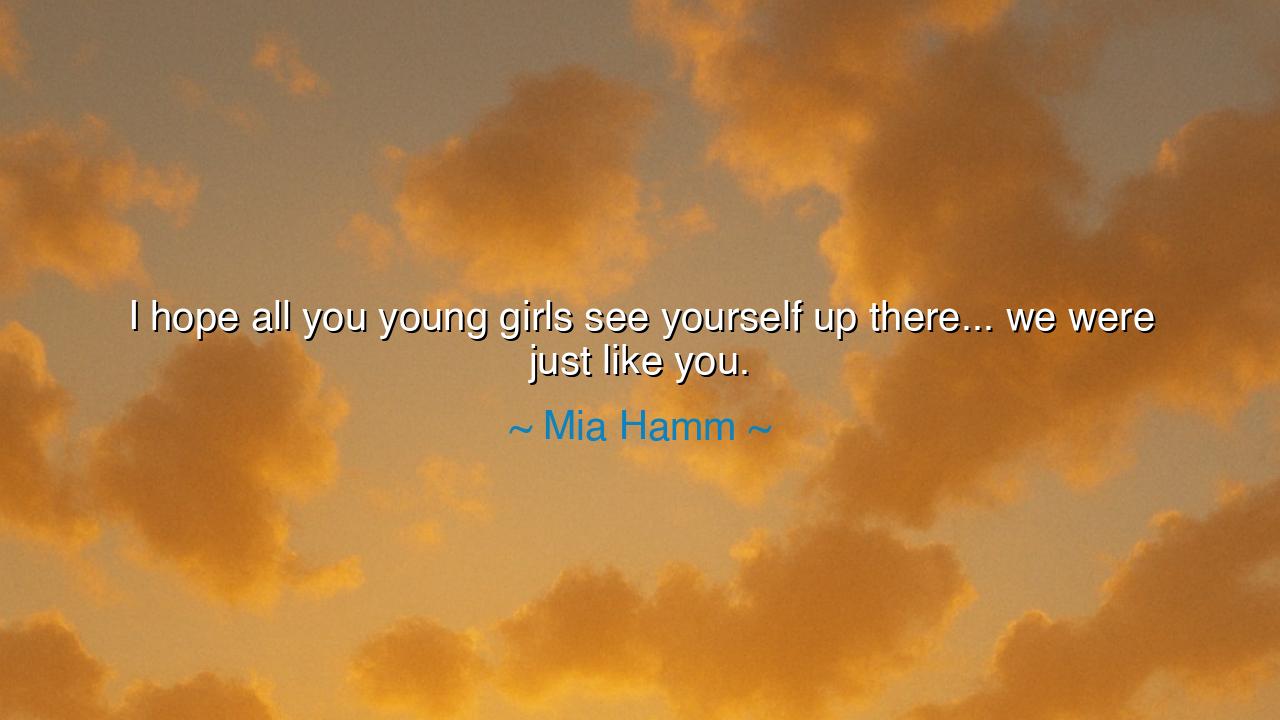
I hope all you young girls see yourself up there... we were just






“I hope all you young girls see yourself up there... we were just like you.” — so spoke Mia Hamm, the warrior of the field, the bearer of dreams, when the sweat of victory still glistened on her brow and the roar of the crowd still trembled in the air. Her words were not only a celebration of triumph, but a call across generations — a message to the daughters of the future, that greatness is not born from magic or privilege, but from perseverance, from courage, from belief. In those few simple words, she offered a revelation: heroes are not otherworldly beings — they are simply ordinary souls who refused to surrender their dreams.
The origin of this quote comes from one of the most electrifying moments in sports history. It was the 1999 FIFA Women’s World Cup Final, a time when women’s soccer stood upon the edge of obscurity, and through fire and will, stepped into glory. The American team, led by players like Mia Hamm, Brandi Chastain, and Julie Foudy, fought through exhaustion, doubt, and the weight of expectation to win before a crowd of more than ninety thousand — the largest ever to witness a women’s sporting event. And when the dust settled and victory was theirs, Hamm’s words rang out not in pride, but in humility. She turned her gaze away from herself and toward the young girls watching from their living rooms and from the stands, whispering: You, too, belong here. You, too, can rise.
Hamm’s declaration — “We were just like you” — is a breaking of illusion, a tearing down of the false wall between legend and learner. For every champion was once a child trembling before their first challenge, every hero once unsure if their efforts mattered. The difference lies not in some divine gift, but in the refusal to yield. Hamm’s words are the antidote to doubt: a reminder that greatness grows in ordinary soil. The young girl kicking a ball in the backyard, the student practicing in the cold before dawn, the dreamer writing by lamplight — all stand upon the same ground from which heroes once rose.
Throughout history, the mighty have passed down this same truth in different tongues. When Joan of Arc, a peasant girl of no noble birth, stood before the armies of France, she, too, shattered the world’s expectation of who may lead and who must follow. Like Mia Hamm, she was once “just like you” — a girl from nowhere, moved by faith and fire to become something more. Every age produces its own Joan, its own Mia: those who rise not because the world was ready, but because their hearts could not wait.
The lesson within Hamm’s words stretches beyond the boundaries of sport. She speaks to every young soul, and especially to every young woman, standing before the wall of the impossible. The message is simple yet thunderous: Do not see greatness as distant from you; it is born from within you. The stars above are not unreachable — they are reflections of the courage that already burns inside. When Hamm says, “see yourself up there,” she does not merely mean upon the soccer field. She means upon the stage of life — in leadership, in art, in science, in every realm where women once were told, “You cannot.”
Her words are a mirror held up to every generation: See yourself — not as the world sees you, but as you could become. See yourself in the footsteps of those who came before, and know that their story can be your story too. For the path of greatness is not paved; it is carved, step by step, by those who dare to believe they belong. Mia Hamm’s legacy is not only in her victories, but in her invitation to others to continue the march — to fill the fields, the classrooms, the laboratories, with the sound of determined hearts.
So, my listener, take this truth as a torch: when you see those who inspire you — the heroes on the field, the poets, the pioneers — do not stand in awe as though they were born of stars. Instead, hear the whisper beneath their triumphs: “We were just like you.” Let that truth ignite your courage. Rise early. Work fiercely. Fail, and rise again. For one day, others will look upon you — upon your victories, your strength, your persistence — and you will say as Hamm once did, “I hope all you young girls see yourself up there... we were just like you.” And thus, the flame of hope will pass unbroken from one generation to the next, lighting the way for all who dare to dream.






AAdministratorAdministrator
Welcome, honored guests. Please leave a comment, we will respond soon